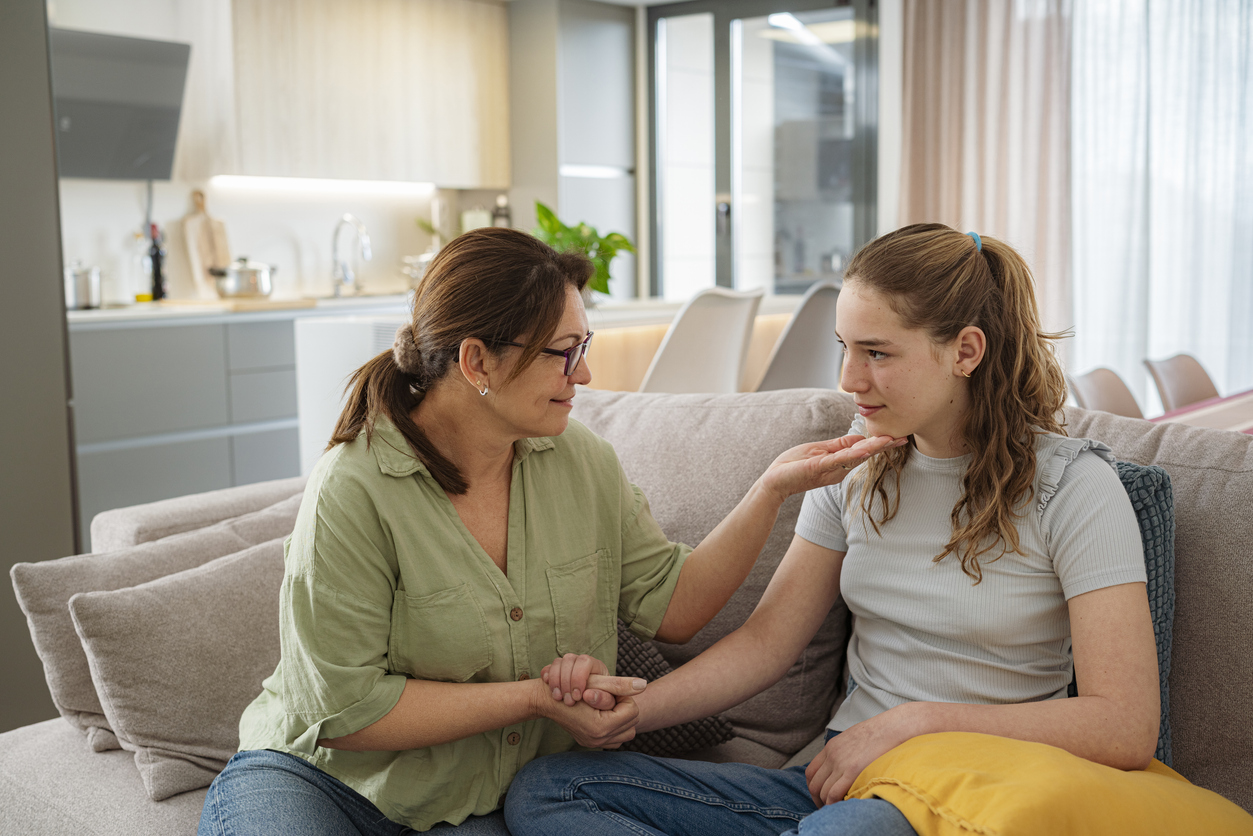Want to know how to help a teenager with anxiety disorder? A parent can support a teenager with anxiety by creating a calm and safe environment, actively listening to their worries without judgment, and encouraging open communication. It’s crucial to educate oneself about anxiety disorders, recognize the teen’s efforts to manage their anxiety, and gently encourage them to seek professional help if their anxiety significantly impacts their daily life. Patience, understanding, and love are key.
Parents do their best to step up to the challenges of adolescence. But anxiety disorders, like other mental health issues, can be overwhelming and challenging to help manage.
When dealing with an anxiety disorder, it’s essential to offer understanding and guidance and to model behavior that helps teens better manage their symptoms and build mental resilience. It’s also important to know when to seek professional teenage anxiety treatment from a teen treatment center.
Many anxiety disorders require treatment, often in the form of talk therapy and medication. Left untreated, teens with anxiety disorders continue to struggle in school and may even develop co-occurring health problems.
This article explores how to help a teenager with anxiety disorder.
How to Help a Teenager with Anxiety Disorder
Anxiety disorders cover a wide variety of mental health diagnoses, all of which share the characteristics of irrational worry and intrusive thinking.
People who struggle with anxiety feel the same way most of us do when faced with a stressful situation, but they may experience additional unwanted thoughts or even compulsive behaviors. Anxiety disorders can result in feeling overwhelmed or excessively worried and frightened, even in situations where there is no rational cause for concern.
Developing resilience towards stress and anxiety takes time and practice, especially for teens. Adolescence is the most common onset period for anxiety disorders, and many people take years to find effective ways to cope with their anxiety. A controlled treatment program can help teens adjust to their anxieties, identify and address intrusive thoughts or unwanted behaviors, and utilize mental exercises, medication, and helpful lifestyle changes to minimize the degree to which anxiety interferes with their daily lives. Here’s how to help a teenager with anxiety disorder.
Related: The Dos and Don’ts of Helping Teens with Anxiety
Talk With Your Teenager and Listen Carefully
Clear and open communication is crucial for a healthy parent-child relationship. However, teens with mental health issues like anxiety or depression rely on a healthy parent-child relationship more so than other teens might.
Improving the way you communicate with your teen creates and fosters an expectation of trust, reliance, and unconditional love. It can also help teens reassure themselves that they can always talk to their parents about their feelings without judgment or negativity.
For some parents, this is easier said than done. Most parents want the best for their children, but many struggle to communicate their concerns or love in a way that a teenager can understand. When teens come to you with their emotional issues, they’re not always looking for solutions to their problems—especially when the solutions you might come up with aren’t always going to apply to the nuances and circumstances of their situation.
Related: 5 Teen Anxiety Symptoms (And How to Cope)
Provide a Supportive Environment at Home
Being a parent means providing a supportive environment at home. However, some parents need to change their expectations of what support might look like when taking care of a teen with anxiety issues.
It’s not just about keeping a clean home or having food on the table – both important. It’s also about the emotional dynamics at home – sibling or parent relationships, conflicts within the family, and unresolved issues. For some parents with anxious children, family therapy can help address root issues that may be contributing to a teen’s stress.
Develop an Understanding of How Anxiety Affects Teenagers
Education matters – not just for teens, but for parents as well. If you’re wondering how to help a teenager with anxiety disorder, then you’re already taking steps in the right direction.
Continue to learn about different anxiety disorders, co-occurring disorders, and common treatment methods. Learn more about how different therapeutic approaches aim to help build a teen’s self-confidence and mental resilience and the roles that stress management plays in reducing anxiety.
Teach Your Teen Coping Strategies
Anxiety symptoms flare up in response to stress. The more challenging things are, the more teens with an anxiety disorder are likely to struggle with unwanted thoughts, worries, or fears. Learning effective and healthy coping strategies can help teens manage their anxiety, both acutely and in the long term.
Effective coping strategies can include music and art, puzzle games, exercise, walks in the park, swimming, or other sports.
Set Realistic Goals
Part of anxiety is worrying. Part of anxiety treatment is worrying about treatment. If your teen is anxious about their therapy, or the progress they’re making, it can help to set periodic goals that provide a sense of progression throughout the treatment process.
If your teen struggles with certain “normal” things because of their anxiety, like getting groceries alone, going to the gym in public, or cooking without instructions, then you could talk to their therapist about finding ways to incorporate these meaningful yet realistic goals into the treatment process. Still, it’s also important to remember that treatment isn’t always about “fixing” someone. It’s okay not to like certain things or to prefer doing things one way over another. This step can include setting realistic expectations for yourself as a parent.
Promote Social Support and Connection
Prosocial behavior is often a marker for improved mental health. Teens open to new experiences and meeting new people share healthier self-esteem and are more likely to have a positive outlook on life.
In treatment, teens also get to know other kids with anxiety problems and similar mental health issues. It can be healthy and helpful to see other people struggle and manage these symptoms and realize that you’re not alone. It can also be helpful to share common challenges and offer mutual support through group chats or meetings.
Explore Teen Anxiety Treatment
Exploring teen anxiety treatment requires a comprehensive understanding of the unique challenges that adolescents face.
A holistic approach is often most effective, integrating evidence-based practices like Cognitive Behavioral Therapy (CBT) and mindfulness techniques with creative outlets such as art and music therapy.
These methods address the symptoms of anxiety and aim to enhance overall well-being and resilience. Additionally, the role of family support cannot be understated; education and guidance for families are crucial in creating a nurturing environment that encourages open communication and understanding.
This multifaceted strategy helps teenagers develop essential coping skills, bolster self-esteem, and rediscover joy and purpose.
Related: The Benefits of Counseling for Teen Anxiety
Teen Anxiety Treatment at Visions
Witnessing your teen struggle with anxiety can be heart-wrenching, but there’s a beacon of hope that shines bright. Joining a teen treatment center can help provide the teen anxiety treatment needed to help teens cope with anxiety.
Visions Adolescent Treatment Centers specialize in tailoring anxiety treatment to the unique needs of teenagers, integrating therapy, education, and support in a nurturing environment.
Imagine your teen embracing life confidently, equipped with coping skills to navigate their emotions healthily and positively.
Contact us today, and let’s take the first step together toward your teen’s brighter, anxiety-free future.
Conclusion
Addressing teen anxiety with a holistic and integrated approach is crucial for fostering resilience and well-being.
By combining evidence-based therapies with creative outlets and strong family support, teenagers can develop the coping skills to navigate their emotions and challenges effectively. Such a comprehensive strategy ensures that adolescents survive and thrive, equipped to face life’s ups and downs confidently.








